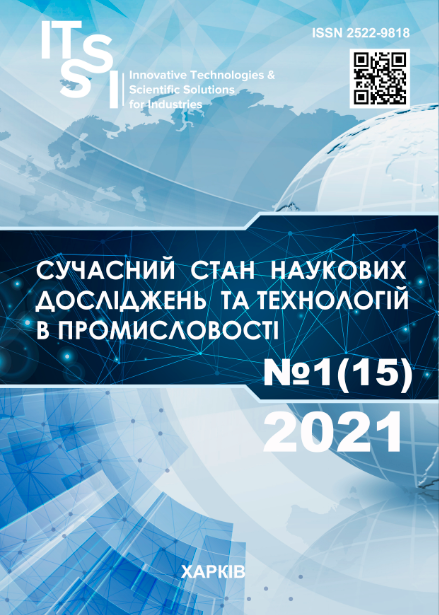MODEL OF ORGANIZATIONAL AND INFORMATION SUPPORT OF SMART CITY STRATEGY DEVELOPMENT IN THE CONDITIONS OF DIGITAL ECONOMY
DOI:
https://doi.org/10.30837/ITSSI.2021.15.083Keywords:
"smart cities", digital economy, ratings of smart cities, balanced scorecard, strategy of smart cities, model of organizational and information support, information and analytical toolsAbstract
The article is devoted to the study of the theoretical and methodological foundations of the development of a model of organizational and information support for the development of smart city strategy in a digital economy. The subject of the study is a set of theoretical, methodological and practical aspects to ensure the formation of a model of organizational and information support for the development of a strategy for smart cities in a digital economy. The purpose of the article is to develop theoretical and methodological provisions and substantiate practical recommendations for the formation of a model of organizational and information support for the development of a strategy for smart cities on a balanced scorecard in a digital economy.: to analyze the most progressive cities in the world to create and implement a strategy of smart cities in terms of leading international rankings of smart cities; to study and systematize methodical approaches to the assessment of smart cities according Objectives to international rankings in the digital economy; summarize the advantages and disadvantages of ranking smart cities; to offer a model of organizational and information support for the development of a strategy for smart cities on a balanced system of indicators in a digital economy. In the course of the research the following methods were used: abstract-logical analysis, theoretical generalization and systematization, system analysis. The paper analyzes the most progressive cities in the world in terms of leading international rankings of smart cities in the digital economy. Methodological approaches to the assessment of smart cities according to international rankings in the digital economy are summarized; their advantages and disadvantages are identified. It is proved that today there is no single methodological approach to assessing the rating of a smart city. A model of organizational and information support for the development of a strategy for smart cities on a balanced scorecard in a digital economy has been developed. Conclusions. A comparative analysis of the Top 10 smartest cities in the world in terms of leading international rankings; on the basis of the conducted analysis the components of the assessment of smart cities are systematized within the framework of the studied methodological approaches to the assessment of smart cities according to international rankings. a model of organizational and information support for the development of a smart cities strategy on a balanced system of indicators was developed, which is considered as an integrated assessment system; the information and analytical tools for assessing the level of balanced development of smart cities, is an informative basis for positioning the city on the selected components of a balanced scorecard are proposed.
References
Navigante Research. More than 250 Smart City Projects Exist in 178 Cities Worldwide", available at : https://guidehouseinsights.com/news-and-views/more-than-250-smart-city-projects-exist-in-178-cities-worldwide
Muraev, Ye. (2020), "Urban development based on the concept of "smart cities" in the digital economy: theoretical and methodological principles of implementation", Innovative Technologies and Scientific Solutions for Industries, No. 2 (12), P. 6–13. DOI: https://doi.org/10.30837/2522-9818.2020.12.109
Oberg, C., Graham, G., Hennelly, P. (2015), "Smart cities - A literature review and business network approach discussion on the management of organisations", IMP Journal, No. 11 (3), P. 468–484.
Zubizarreta, I., Seravalli, A., Arrizabalaga, S. (2015), "Smart city concept: What it is and what it should be", Journal of Urban Planning and Development, No. 142 (1), P. 1–8. DOI. https://doi.org/10.1061/(ASCE)UP.19435444.0000282
Alkandari, A., Alnasheet, M., Alshaikhli, I. F. (2012), "Smart cities: a survey", Journal of Advanced Computer Science and Technology Research, No. 2 (2), P. 79–90.
Andrienko, A. A. (2018), "SMART-approaches to the development of large cities: prospects for implementation in Ukraine" ["SMART-pidkhody do rozvytku velykykh mist: perspektyvy vprovadzhennya v Ukrayini"], Public Administration and Local Self-Government, Vol. 3 (38), P. 100–106.
Korepanov, O. S. (2018), Methodological bases of statistical maintenance of management of development of "smart" sustainable cities in Ukraine [Metodolohichni zasady statystychnoho zabezpechennya upravlinnya rozvytkom "rozumnykh" stalykh mist v Ukrayini] : monograph, Kyiv : SE "Inform.-analit. Agentstvo", 354 p.
"IESE Cities in Motion Index 2020", available at : https://media.iese.edu/research/pdfs/ST-0542-E.pdf
"IESE Cities in Motion Index 2019", available at : https://media.iese.edu/research/pdfs/ST-0509-E.pdf
"Smart City Index 2020", available at : https://www.imd.org/smart-city-observatory/smart-city-index/
"Smart City Strategy Index 2019", available at : https://www.rolandberger.com/en/Insights/Publications/Smart-City-Strategy-Index
"PwC. Cities of Opportunity", available at : https://www.pwc.com/us/en/cities-of-opportunity/2016/cities-of-opportunity-7-report.pdf
"EasyPark Group. EasyPark", available at : https://www.easyparkgroup.com/smart-cities-index/
"Global City Index 2020", available at : https://www.kearney.com/global-cities/2020
Muraev, E. V. (2020), "Development of a strategy of smart cities of Ukraine according to a balanced system of indicators in the digital economy" ["Rozrobka stratehiyi rozumnykh mist Ukrayiny za zbalansovanoyu systemoyu pokaznykiv v umovakh tsyfrovoyi ekonomiky"], Bulletin of Khmelnytsky National University, No. 4, Vol. 2 (284), P. 106–109.
Downloads
Published
How to Cite
Issue
Section
License

This work is licensed under a Creative Commons Attribution-NonCommercial-ShareAlike 4.0 International License.
Our journal abides by the Creative Commons copyright rights and permissions for open access journals.
Authors who publish with this journal agree to the following terms:
Authors hold the copyright without restrictions and grant the journal right of first publication with the work simultaneously licensed under a Creative Commons Attribution-NonCommercial-ShareAlike 4.0 International License (CC BY-NC-SA 4.0) that allows others to share the work with an acknowledgment of the work's authorship and initial publication in this journal.
Authors are able to enter into separate, additional contractual arrangements for the non-commercial and non-exclusive distribution of the journal's published version of the work (e.g., post it to an institutional repository or publish it in a book), with an acknowledgment of its initial publication in this journal.
Authors are permitted and encouraged to post their published work online (e.g., in institutional repositories or on their website) as it can lead to productive exchanges, as well as earlier and greater citation of published work.














